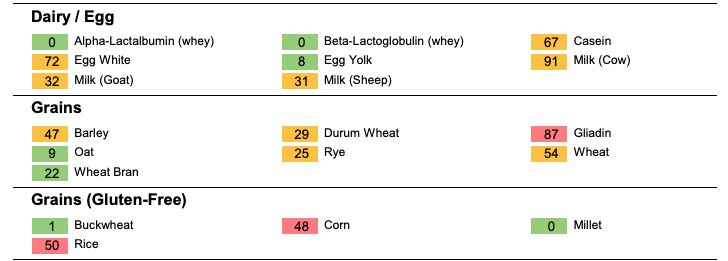Food Sensitivity Testing
The #1 most common question I get asked by new patients is “Do you do food sensitivity testing?”
Food sensitivities and food sensitivity testing has become a hot (and hotly debated) topic. Patients are interested in this type of testing because they often notice that foods seem to impact symptoms they’re experiencing yet they’re having trouble clearly or completely identify the offending foods.
It’s tough to determine which foods are causing you grief because we’re typically eating mixed meals, which may be processed, and they’re often consumed outside of the home (so we’re not exactly sure what’s in everything anyways). Plus reactions are often delayed…so you could be reacting to something you ate yesterday vs. breakfast this morning.
There are 2 ways to identify foods that you are currently sensitive to: elimination diet and reintroduction period OR IgG food sensitivity blood test.
Health conditions that may be linked to food sensitivities
- Anything digestion related (Irritable Bowel Syndrome (IBS), constipation, diarrhea, nausea, bloating)
- Skin conditions that include rashes like eczema or psoriasis
- Behavioural problems
- Bronchitis and asthma symptoms
- Joint pain
- Migraines
- Weight loss resistance (try and try but the weight just doesn’t come off)
- Immune conditions
- Menstrual pain
What are food sensitivities?
Results can be surprising as any number of foods in your diet could be responsible for your symptoms.

What is food sensitivity testing?
A food sensitivity test is a blood test used to identify foods your body is reacting to. It tests your body’s immune response to approximately 120-200+ foods (depending on how comprehensive the test is).
Should I get tested for food sensitivities?
Patients experience immense symptom relief and health optimization when reactive foods are removed from the diet.
If you experience any of the symptoms or conditions I listed above, I definitely recommend food sensitivity testing.
If you’ve ever felt like your symptoms are linked to something in your diet, but you can’t put your finger on what, then I also recommend food sensitivity testing.
Book a visit with Dr. Natalie and have your food sensitivities tested!
Does OHIP cover food sensitivity testing?
Sample Test Result (excerpt)


